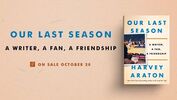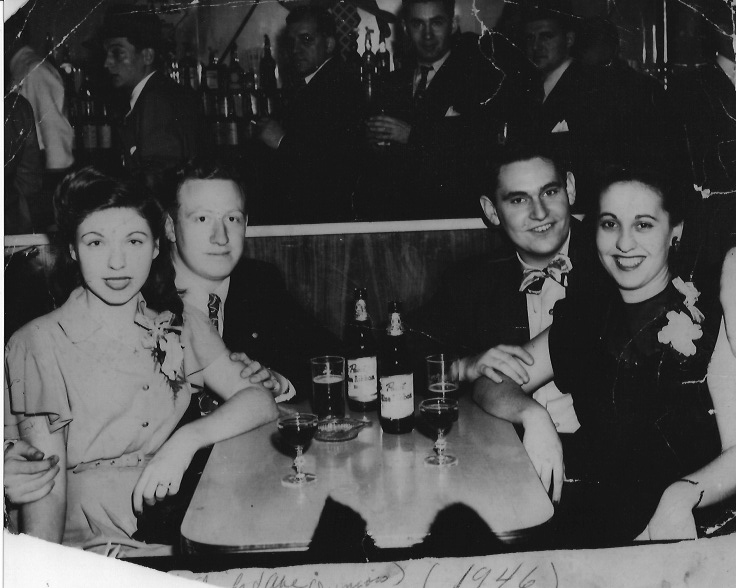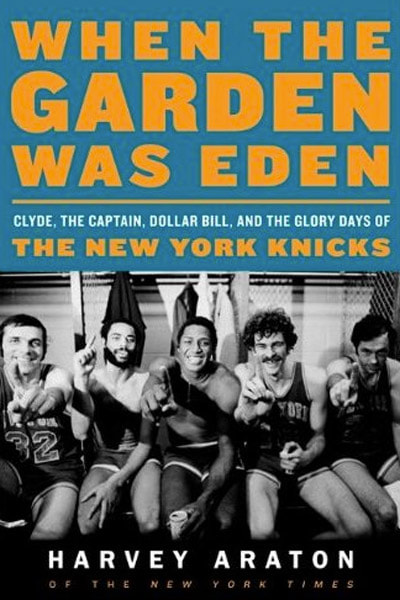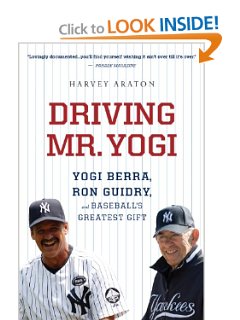The men are nursing half-empty glasses of beer, next to Pabst Blue Ribbon bottles while the women celebrate with red wine. My mother’s new diamond is visible on her left ring finger. An empty ashtray sits in the middle of the table. Men behind them, smoking and drinking at the bar, pose as backdrop. At the bottom of the photo, in pen-scrawled script, is the year it was taken, 1946, along with the name of the restaurant, Junior’s, still famously in business on Flatbush Ave. in downtown Brooklyn.
It is an ideal place from which to begin this unambiguous New York testimonial to the endurance of life through love and loss.
I have seen this photo before, of that I am certain, though it has probably been decades since my mother pulled it out of an album to show off her youthful radiance. Now I study it in an entirely altered context, demanding a rewrite of not only the caption but the larger narrative as well.
My father and the smiling woman in the dark dress across the table from my parents are long gone, passing a year and a half apart almost a quarter century ago. At 67, in 1990, my father, Gilbert Araton, suffered a fatal heart attack, leaving behind a 62-year-old widow, who dreaded going home after work in Manhattan to her empty apartment in a two-family row house on the outskirts of Canarsie in Brooklyn.
Being that age now, I can better understand her insomniac nights of wondering how she would face the cold winters and lonely summers she believed were ahead. I can also appreciate how Abe Babitsky could pursue my mother romantically so soon after his wife, Shirley -- the woman across from my mother in the photo -- had died of lymphoma, a year and a half after my father’s passing.
All he needed was my mother’s consent. But all she could think of before even entertaining such an offer was the blessing of her children.
Under the circumstances, it wasn’t so easy to give. Who wouldn’t have reservations, much less an instant and intuitive opposition to the thought of their mother with another man, and the one who just happened to have been the best man when she married their father? Beyond strange, the proposal – of a relationship, not marriage -- seemed much too soon. No doubt it was the sound of her pent-up emotions unmoored by my two sisters’ concerns-bordering-on objections that moved me to temporarily put her potential happiness above my personal misgivings. The truth was that I lied when I told her during our daily telephone conversations – I would check in before bedtime from six time zones away in the French Alps, where I was covering the Winter Olympics for the New York Times – that she had to think of what was best for her.
“He wants it to be, you know,” she told me, sheepishly.
“Like a relationship?”
“Yes, like that.”
But how was this possible, I asked, when his wife had only been gone for so little time? How could a few companionship dinners between old friends evolve so quickly into, well, whatever?
“She wanted us to be together,” Abe would tell me years later.
“She?”
Yes, as his story went, Shirley had insisted that he had already suffered enough, having buried their young adult daughter, enough grief to last 10 lifetimes. He shouldn’t have to be a burden on their son, who lived more than three hours away. He shouldn’t have to be alone.
“When I go, you’ll be with Marilyn,” she told him, referring to my mother, granting permission, almost by proclamation, for two people she loved to build a future out of their past.
###
My father grew up on Manhattan’s teeming Lower East Side, where he developed three childhood friendships – Abe, Louie and Ruby – that would endure into adulthood. He was Gil, or Red, to the other boys on Ridge St. Children of immigrants, they survived adolescence and war, returned to the city to find blue-collar employment, marry and start families. Ruby died young, I recall my father telling me. Louie moved upstate and eventually to Florida with his wife and sons. But Abe and Shirley settled in Brooklyn, where my family had lived and to where it returned after several trial years in more rural Staten Island.
Across the decades, my father and Abe remained pals, ubiquitous in photographs of family occasions, always ready to celebrate together, or grieve. Personality wise, they seemed quite different, Abe drawn to vices like the racetrack, my father a contented homebody. But so well versed were they in Yiddish and English colloquialisms associated with the Jewish ghetto that I can’t seem to summon my father’s voice anymore without interference from Abe’s.
Was their cultural similarity the primary source of discomfort my sisters and I felt after he boldly made his intentions known to my mother, as early as her Shiva call? Could our father be replaced that easily by someone who just sounded like him?
My mother at first thought he was joking, and then wondered if he had lost his mind. But their dinners continued, my mother initially telling herself that these weren’t really dates, just two old friends getting out of the house. But by the time I was calling from France, I could tell she was reconsidering, entertaining the offer. She could at least envision a relationship beyond platonic.
I understood how my sisters felt. My emotions were no different. These were not elderly people, still only in their 60s. What was the rush? Beyond mourning, shouldn’t there have been a reasonable period for them to discover whether they liked each other in that way? And if they already knew, what were we supposed to conclude from that?
As my calls from France continued, it seemed to me that my mother was waiting for me – for someone in the family – to tell her it was all right. The best I could offer was, “You have to decide.” Until one night, when she cried and fretted about being alone for the rest of her life, and I finally took a deep breath and told her what she wanted to hear.
“You have a lot of years ahead of you. You can’t worry about what other people think, including your children. You have a right to live your life.”
Looking back, I would like to take credit, claim that my gesture was a turning point. But I know better. As the middle child, the boy in between, I was always the more independent one and in later years the mediator in family disputes, without any real power to impose judgment. My mother may have vented to me about how difficult my sisters were being, but I also knew she wasn’t going anywhere without their approval.
Abe was a patient man. Alone, he went to a Catskills resort with the notion he might meet someone else, someone who would bring no emotional baggage. Instead, he bought a stack of Hallmark cards and mailed them, two a day, to my mother in Brooklyn. He ran up $150 in telephone bills, calling her from his room.
He returned home and talked her into a drive to Atlantic City, where as a regular patron at one of the casinos he qualified for a free room and meals. They took in an evening show, after which Abe decided he needed a nap before the drive back to Brooklyn. My mother had made it clear she would not stay over, even in a room with two beds. Her classic line was, “I’m not that type of girl.” Abe fell asleep. Overcome with guilt by just being in a hotel with another man, my mother called my sisters to let them know where she was, with whom and why.
Recounting the story to me many years later, she would blush and say, “That’s my way.”
Like parents becoming convinced that their child was at least acting responsibly, growing capable of making important life decisions, my sisters began to warm to the relationship. When my mother packed up her and my father’s apartment and moved into Abe’s place – the home of his family -- in 1993, we could all admit it was a relief that she would no longer be living alone.
For the sake of my father’s U.S. Postal Service pension and other financial considerations they said they would never marry. Yet it wasn’t long before Abe crossed the threshold that separated extended family from inner circle. Not that there weren’t situations – beginning with those early signs of affection we couldn’t for the life of us recall from our parents’ marriage – that posed questions better left unanswered. Don’t go there, I told myself. Don’t ask if this new relationship was more fulfilling in ways that went even beyond affection. With Abe, my mother traveled by plane for the first time in her life, vacationed in Florida, California and Israel, places we know she would never have visited had our father lived.
When my mother talks to me about her time with Abe, it is with a remarkable candor. Over the years, she has grown resolute not only in the belief that the relationship has been the best thing for her, but also that she was entitled. She turned 88 this week. He turned 90. Both families celebrated with a party in Brooklyn.
Neither is inclined to waste time with apologies or guilt. In fact, Abe and my mother take pride in telling me how every morning, thankful for another day together, they wake up with a kiss and a simple declaration, “I love you.” If this is also a commentary on what their marriages might have lacked, or grew to lack, they say they can’t undo their mistakes, only learn from them.
Their relationship has brought benefits for the rest of us, as well. My young adult sons never knew their grandfather but over a meal, Abe’s memory will be jarred and he will suddenly look at me and say, “Your father. . .” And here comes another story about a favorite candy store on now-gentrified Houston Street or what life was like in a New York tenement or a silly prank they played on Louie or Ruby. A window into the past will be pried open. With such tales of youthful adventure, Abe brings my father to life for Alex and Charly in ways that I cannot.
As a family, we look forward to making the drive into Brooklyn from our home in New Jersey for a late afternoon visit. We sit in the living room of the two-bedroom apartment Abe shared with Shirley and their children. Now it is festooned with photos of grandchildren and great-grandchildren from our family and his. In two shifts, we will drive to a nearby diner. After a meal, we will say our goodbyes by the car because my mother and Abe will have announced their intention to walk home.
Walking has long been Abe’s passion and he has convinced my mother that the exercise is good for her; her excellent health of body and mind deep into her 80s has been evidence of that. They seem to walk everywhere but to Atlantic City, holding hands like a teenage couple, drawing smiles from younger folks who think they are cute. Abe reminds us that my mother has tripped on uneven sidewalks a few times. The hand-holding is as much a matter of pragmatism as anything else.
“We hold each other up,” he says.
From the car, teary eyed, we watch them stroll down the street and my wife will invariably say, “They’re so sweet together.” I will nod but also see something different from her and everyone else. For me, they have never been just a lucky couple, together in twilight. They remain the foursome they were in 1946 at Junior’s on Flatbush, my father and Shirley walking right alongside. That is the snapshot in my mind that cannot be erased.




 RSS Feed
RSS Feed
